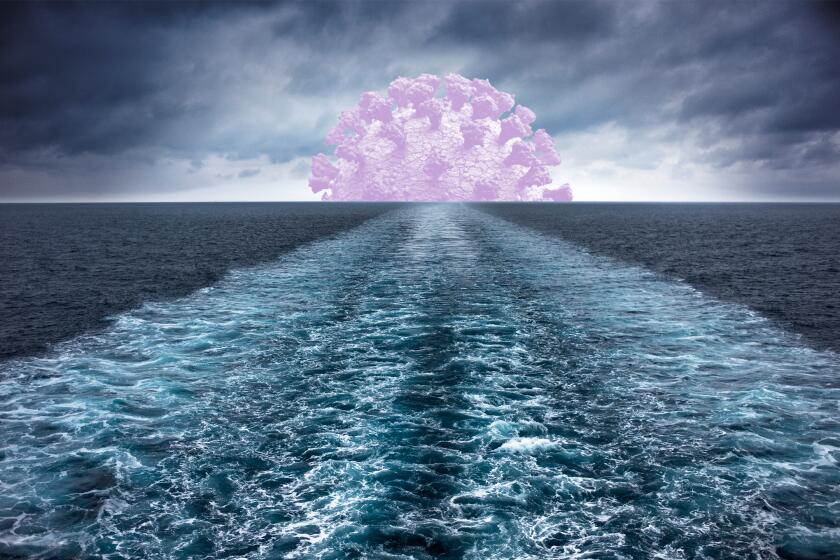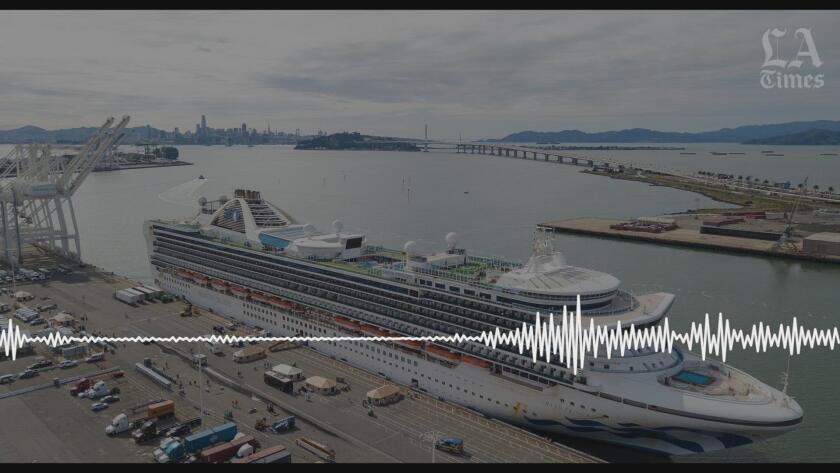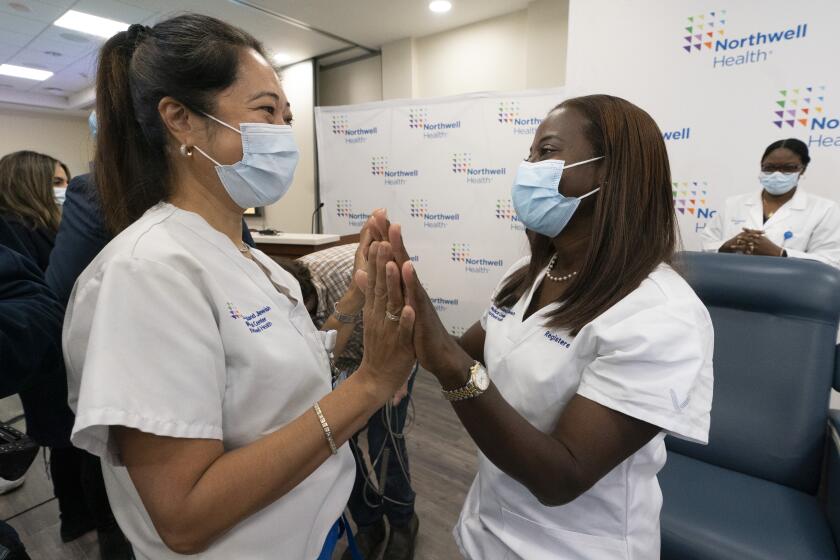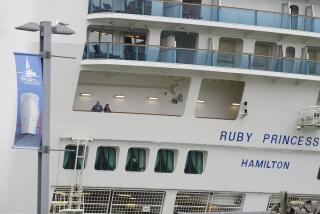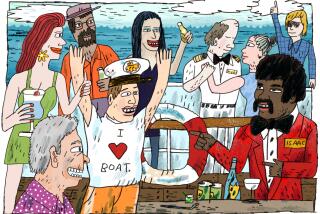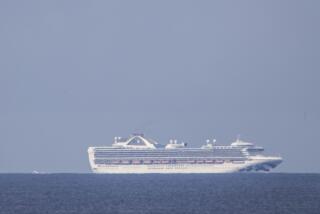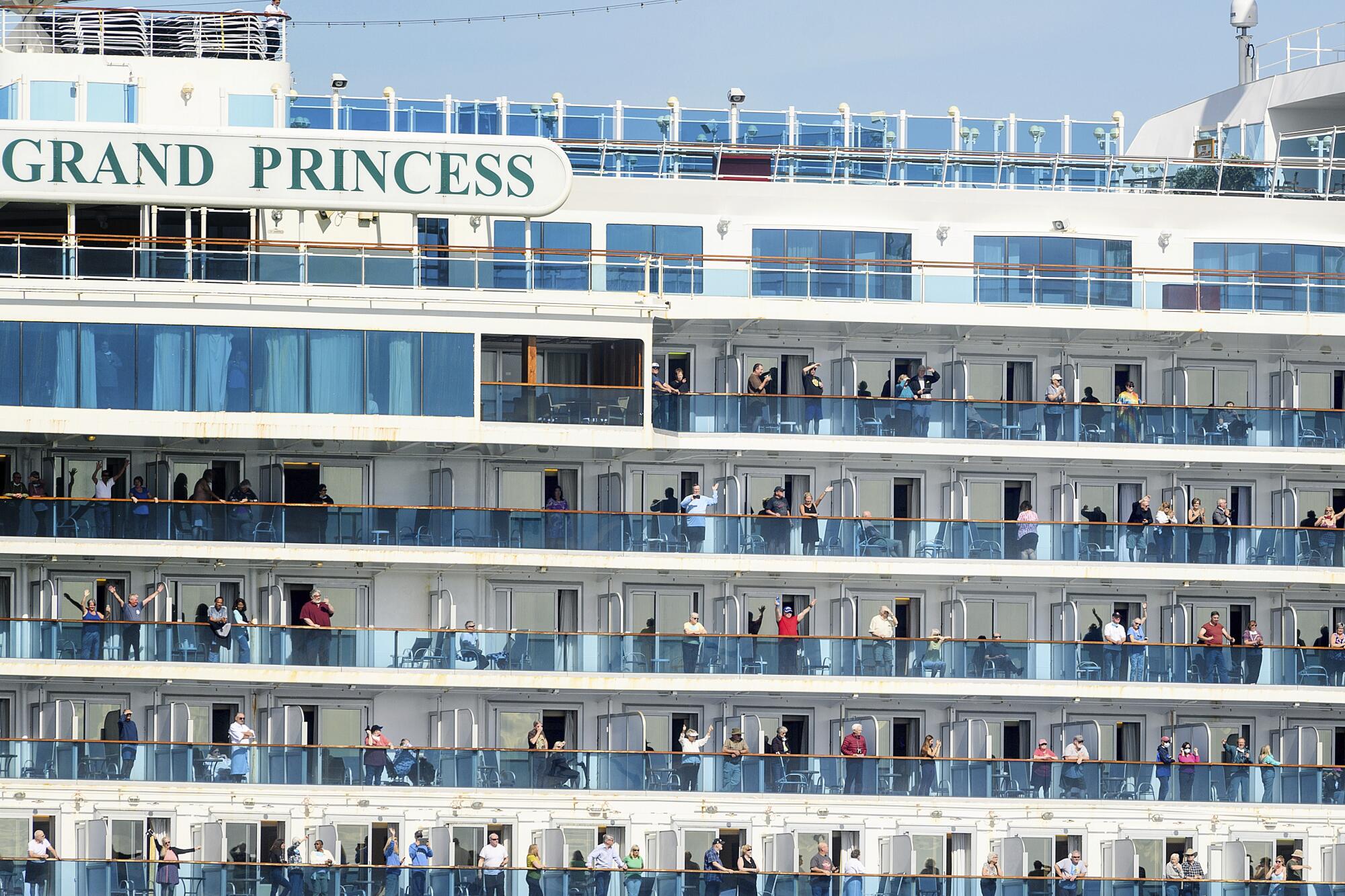
- Share via
Michael Dorety was a retired 68-year-old Dallas firefighter who had the long-standing mental habit of calculating catastrophes, the better to avoid them. He sat by exit doors. He refused to book 11th-floor hotel rooms, because engine ladders only reached 10. He taught his kids to avoid escalators, which could snag shoelaces.
Yet Dorety showed no alarm when he and his wife, Susan, climbed aboard the Grand Princess cruise ship at Pier 27 in San Francisco on Friday, Feb. 21, joining some 2,500 passengers and 1,100 crew members. It was supposed to be a 15-day cruise to Hawaii, with a brief stop in Ensenada.
The Texas couple had crossed the oceans on dozens of cruises, and this trip was meant to celebrate their 40th anniversary.
His habit of caution, sharpened over decades of answering 911 calls, gave her comfort when they traveled. “He always did the what-ifs,” she said. “I can guarantee you, if there were any what-ifs about this trip, he would not have been on there.”
As people boarded, Susan Dorety recalled, the ship seemed to take no special precautions, even though there had been a coronavirus outbreak on another company ship, the Diamond Princess, earlier that month in Japan.
The Grand Princess began crossing San Francisco Bay toward the Pacific just before sunset. Passengers stood in the wind, aiming phones at the Golden Gate Bridge as it passed overhead, and the big horn sounded.
The “mysterious respiratory illness” had just acquired its official name 10 days earlier. The deaths were still mostly in China, with none so far reported in the United States. It was still possible to contain the virus, the director of the World Health Organization said, adding: “The window of opportunity is narrowing.”
On the Grand Princess, crowds formed at the buffets, grills and pizzerias; drinkers lifted cosmopolitans and lemontinis at the bars; the new plague multiplied invisibly among passengers and crew.
So many images now vie to define the time of COVID-19: Zoom grids. Ghost-town capitals. Infection trend lines. Death behind plexiglass. The pathogen itself, depicted as a pocked little asteroid bristling with crimson blooms.
The outbreak aboard the ship is a window on the early days of the pandemic’s spread, and of the shifting, improvisational, sometimes fumbling response it engendered.
But it’s also a reminder of how wildly the last 10 months have warped time and memory. Because at the beginning, there was this: a boat circling off the California coast, trying to get home — a 949-foot, 108,000-ton floating purgatory without a port.
::
Burly, garrulous Mike Dorety, a steady hand in so many emergencies, did not like to stray far from his wife. “I need you,” he’d say if she wandered away. Together they browsed in the gift shops and read on the deck lounge. When the ship reached Hawaii, they climbed off together to explore.
The mood had grown edgier, in the days it took to cruise 2,500 nautical miles. Passengers who picked up the Honolulu Star-Advertiser on Feb. 27 saw the headline “Isle residents stock up on supplies.” Crowds were besieging big-box stores to grab hand sanitizer and toilet paper.
As the boat turned back to the mainland, it labored through a pounding, deck-rocking storm. Pool water sloshed over the rim at Neptune’s Reef and Pool.
On Wednesday, March 4, passengers awoke to find the daily newsletter, Princess Patter, announcing “some of the day’s onboard highlights,” including: A speech about dolphins in the Princess Theater. A Mexican Fiesta on Deck 5. The Marriage Match Game Show on Deck 7. The Drink of the Day was Beverly Hills Ice Tea for $10.
And another communication: A letter from the cruise line’s chief medical officer had been slipped under their doors overnight. It notified passengers that the Centers for Disease Control and Prevention was investigating “a small cluster” of COVID-19 cases in Northern California connected to a Grand Princess cruise to Mexico a couple of weeks earlier.
Some of the guests from that trip were still on board — back-to-backers, they were called — along with many crew members.
There was no indication that anyone on board had it. But the stop in Ensenada the next day would be canceled — they would head straight to San Francisco.
Soon came more unsettling news. California was reporting what was believed at the time to be its first COVID-19 death. It was “an elderly adult with underlying health conditions” from Placer County, and he had been on the Grand Princess trip to Mexico. “Other cruise passengers may have also been exposed,” the news release said.
The Doretys, who were in L222 on the Lido deck, knew they had some back-to-backers in their hallway. The couple had chatted with them, and taken note of their tans from the sunny Mexico trip.
Now the Doretys wondered where the Placer County man had stayed on the ship. Which dining rooms had he visited? Who were his waiters? Were they still on board? Was the virus on board too?
Similar questions were going through the mind of Monica Achter, 52, an artist from Layton, Utah, who was staying in room B628 on the Baja deck. It was her first cruise, and she was traveling with her parents.
Even as people kept crowding into restaurants and cafes and lounges, she noticed deck attendants with yellow buckets scrubbing surfaces by the elevators. She was struck by a new, pervasive quiet.
“We just looked at each other like any of us could be infected,” she would write in a memoir of the experience. “It was like trying to go back to normal after learning there was a murder on the ship and any one of us could be the killer. There was an air of accusation floating in every interaction.”
The captain, John Harry Smith, whose regular Messages from the Deck were piped into rooms and restaurants and cafes across the ship, had reassured people through the storm in a calm and sonorous British accent. He was not one of those cruise-ship captains who interacted with guests only when obliged. He was known to mingle and pose for photos. Now he came on to announce that big gatherings would be curbed, on the advice of the CDC.
In an abundance of caution, we have regretfully made the decision to cancel this evening’s Captain’s Circle party as well as the entertainment activities of “Born to Dance” and Marriage Match…
The captain was from Cheltenham, England, the newsletter informed passengers, and had joined the Merchant Navy as a deck boy in 1983. He had been with “the Princess family” since 2007.
Our entertainment team is working to have a copy of “Born to Dance” loaded onto our video-on-demand platform along with other new programming so that you can enjoy this wonderful show from the comfort of your stateroom… We recognize the last days of this cruise are not what we all hoped for from our guests…
Mike and Susan Dorety went to dinner that night, drank martinis at the bar and chatted with fellow passengers.
On Thursday, Princess Patter promised vestiges of normalcy on Deck 7 that night: the Miracle Lyrical Game Show, then the Missing Spaces Game Show (“another night of laughter!”), then Karaoke Fun.
But Susan Dorety knew things were different by the time she and her husband got to the breakfast buffet. You couldn’t scoop your eggs onto your own plate — servers were now doing it for you. The salt and pepper shakers had been removed. And if you wanted sugar in your coffee, you had to flag someone down.
Achter, the memoirist in B628, did water aerobics in the hot tub and lunched with her parents. She was standing in line at the internet cafe when a woman coughed, then — because it was now necessary — hurriedly explained: “It’s OK, I’m not sick.”
Will travelers ever want to sail again? Cruise junkies say yes; experts say it might take a long time for the industry to recover.
Here came a helicopter, with medical staff climbing on board to take samples of 46 passengers and crew deemed most likely to have been exposed. Mike Dorety was not among them; he felt fine.
In an abundance of caution today they have asked us to implement additional recommendations…
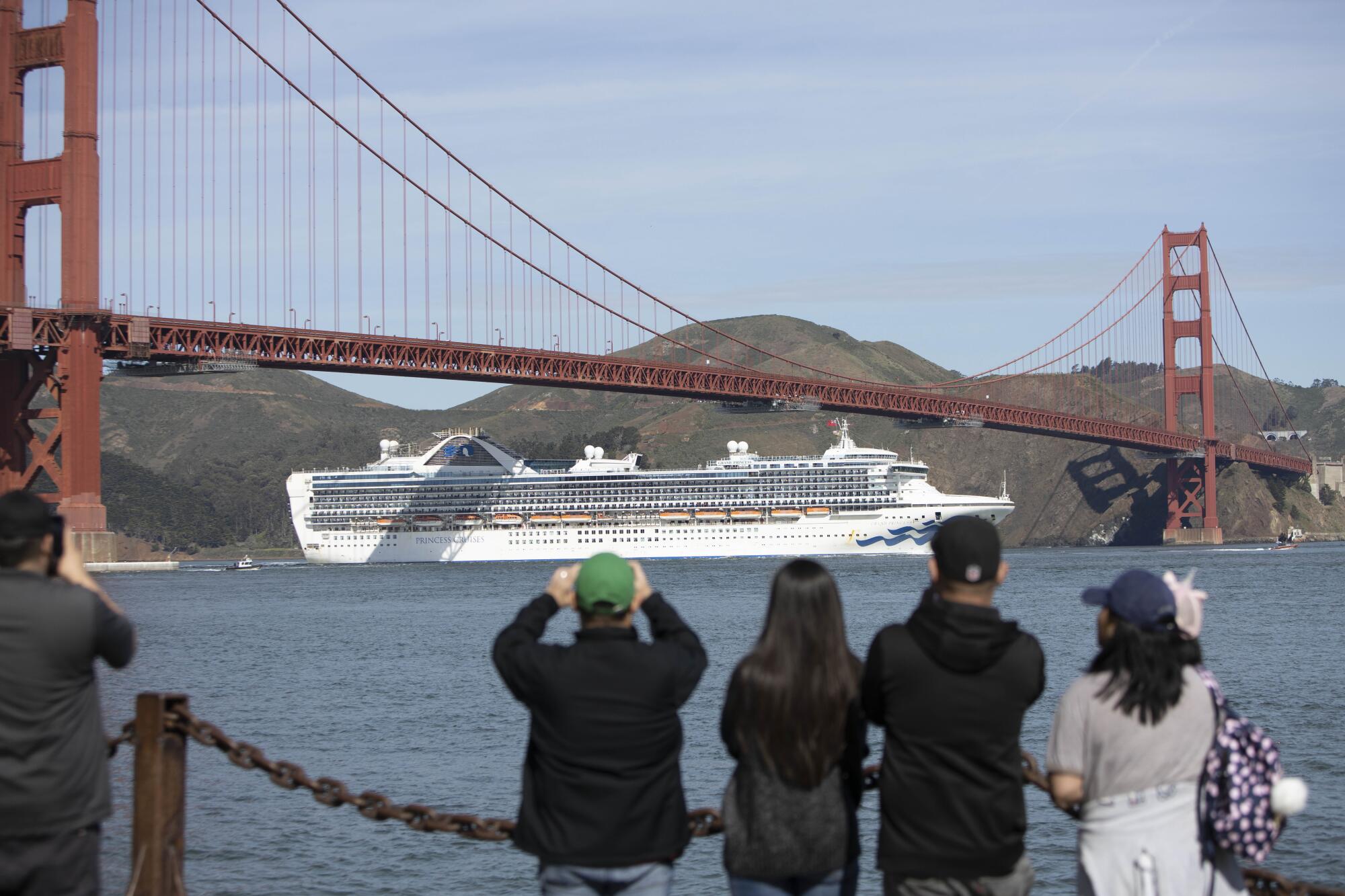
Now Smith was saying that all social gatherings would be canceled. The bars and boutiques, the gym and casino, closed.
The CDC has also recommended that guests should remain in their staterooms for the remainder of the cruise. This will be disappointing to hear. However, after lunch today, we ask that you return to your staterooms….
On video of the moment, passengers can be heard reacting with groans. The Doretys watched people taking food back to their rooms. From now on, they’d have to depend on room service.
For those with balcony rooms, there was still ocean air; for those in cheaper inside rooms, for the rooms without windows, the days and nights in confinement would become hard to tell apart.
As a reminder, we do not have any confirmed cases of Covid-19 on the Grand Princess…
Grand Princess Capt. Robert Smith updates passengers about how the ship is responding to a possible coronavirus outbreak onboard.
The boat would not be allowed to dock in San Francisco. It was too close to the crowds of the Embarcadero. Passengers heard rumors of someone threatening to blow up the ship if it docked.
To make this time easier we have added more content to our on-demand entertainment programming, and increased the ship’s internet bandwidth…
Friday’s Princess Patter was threadbare of fun but advised that Steve’s Quiz of the Day would be one of the in-room offerings.
We are presently cruising approximately 47 miles off the coast of California in something of a holding pattern. Sea conditions are good and the weather overcast, but no rain today so far, so good news. Ship remains safe and secure…
Passengers saw the ship making a peculiar pattern on the screens tracing its trajectory. “We’re circling,” everyone said. But the shape of their watery limbo was really a vast rectangle with incredible ruler-straight sides, traced and retraced.
We have added 100 new movies to your television’s on-demand menu and they’re in the process of delivering an activity kit to each stateroom. Remember it is important to stretch your mind and body regularly…
The captain said he was awaiting word from health authorities about the results of yesterday’s virus tests. It was Vice President Mike Pence, however, who announced the “very difficult results” that afternoon on TV.
“Twenty-one individuals on the Grand Princess tested positive,” Pence said. “Among those were 19 crew members and two passengers.” It was not yet clear where the ship would be allowed to dock, but it would be “a noncommercial port,” he said.
Into the rooms came the captain’s voice about 35 minutes later, reiterating the vice president’s message with a hint of frustration.
You may have heard this on the news by the media already, and we apologize but we were not given advance notice of this announcement by the U.S. federal government. It would have been our preference to be the first to make this news available to you…
President Trump was touring the CDC in Atlanta, where he announced that the virus was thus far confined to just 240 cases in the United States.
“We’ve had 11 deaths, and they’ve been largely old people,” Trump said.
“What should be done about that cruise ship?” a reporter asked.
The president said they were weighing options, but it was his preference to keep the passengers on board.
“I like the numbers being where they are,” Trump said. “I don’t need to have the number double because of one ship.”
This was a demoralizing moment for some passengers. “It made me feel like I was abandoned,” said Cheri Harris, 63, who was in room C629 on the Caribe deck with her husband, Alfred. “‘OK, you are an inconvenience now — you are unimportant.’”
Harris said her husband was angry about the confinement and wanted to make a scene. “He was super angry when they wouldn’t let us get any fresh air. He was ready to storm the customer service desk. ‘I have rights. They can’t force me to stay in this cabin.’ I talked him down off the ledge. I said: ‘Guess what? There is a brig on this ship, and if you make a fool of yourself [they’ll] put you in the brig.’”
She and her husband were veteran cruisers who had enjoyed the arts and crafts and the trivia competitions. She had taken a ukulele lesson, and they were looking forward to participating in the big talent show, now canceled.
“We called it Voyage of the Damned, Plague Ship,” said Harris, who would remain a cruise-ship enthusiast even after the experience. “We had all kinds of terms of endearment for our cruise.”
On Saturday, March 7, Smith reassured guests they’d be home as soon as possible.
We understand your frustration…
The Princess was scrambling to improvise. Rowena Vasquez, the onboard hula-dancing instructor, helped the crew cobble together activity packages every morning to drop off at passengers’ rooms. Assembly lines would form; in went crossword puzzles, decks of cards, improvised origami paper.
“It was really kind of scrounging,” said Vasquez, who along with her husband, the ukulele teacher, had worked on the Grand Princess for years.
“We kind of fly by the seat of our pants,” she said. “As Hawaiians, you kind of ride the waves, and you don’t get upset over things you have no control over.”
::
California Gov. Gavin Newsom’s office had been in secret discussions with Oakland Mayor Libby Schaaf. The governor and federal officials had settled on Oakland as the docking point.
“He walked me through why they wanted to dock the ship in Oakland,” Schaaf recalled. “My immediate reaction was: ‘Why was it not going to its home berth in San Francisco? Is this not just a continuation of the unjust history of dumping environmental hazards in Oakland?’”
The Oakland port was not meant for cruise ships — it was one of California’s busiest ports, with about a million cargo containers coming in every year and another million going out. But the site was in an industrial area, away from crowds, and could be fenced off. Schaaf said OK.
The logistical effort would be massive. Along with more than 2,000 Americans, the ship had guests from 23 nations and a crew from more than 40, including more than 500 crew members from the Philippines, according to the CDC. They would need to wait for their countries to send planes to repatriate them.
The Americans would quarantine at military bases. There were about 1,000 Californians, who would go to in-state bases, while the other Americans would fly to Georgia and Texas.
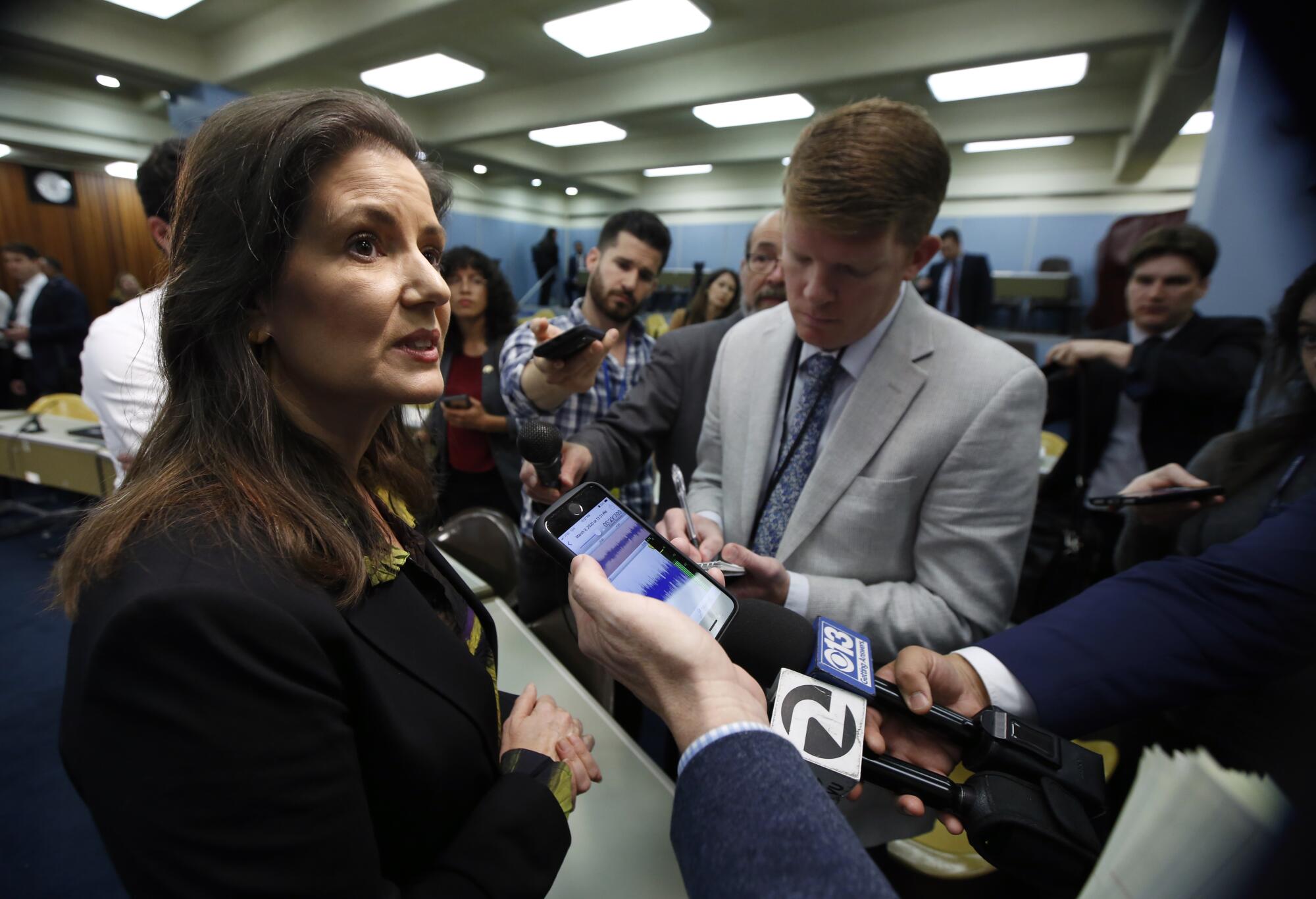
Danny Wan, the Oakland port director, recalled the effort as “a hurricane of uncertainty and activity,” one that in some ways foreshadowed the year ahead.
“It was really a crash introduction to the emergency that still exists today,” he said. “There wasn’t a lot of ramping up. There was just, ‘Here it is.’”
The Oakland plan was announced at a news conference on Sunday, March 8. Smith told passengers that disembarkation was expected to take two or three days.
As you know, this is a rather fluid situation…
Let’s all stay strong together…
We’ve been approved to begin a program to rotate guests and to get some fresh air and sunlight. We will share details shortly…
On shore, friends and loved ones and relatives were struggling to find out what was happening. Robin Clawson, a Santa Cruz resident, learned that her parents were stuck on the boat and launched a Facebook page so people could exchange information.
“They didn’t have a way to communicate with each other,” she said. “It was just a big cluster from the very beginning.”
::
In L222, the Doretys were packed and ready. Mike was irritated. He wanted to get back to Texas, back to the sheep he had been raising on his three acres outside Fort Worth. He was tired of cruise ship food.
“I’m ready for a Whataburger,” he said. “I’m ready to be home.”
The Grand Princess passed under the Golden Gate Bridge on Monday, March 9, and cheers erupted on board.
Alcatraz Island appeared up ahead, and among passengers there were jokes that the government had the old prison pegged as their new home.
More from Christopher Goffard
Mike Dorety had awakened that morning drenched with sweat. He showered and changed and went back to sleep.
“Your dad’s sleeping” a lot, Susan told her son on the mainland. “He’s really tired of being in here.”
As people were making their way down the gangplank in assigned groups, she was trying to keep her husband covered with towels and robes and a comforter, but he wouldn’t stop shaking.
She said she called the ship’s 911 line multiple times, pleading for help, and was told a report would be filled out. They had to wait their turn to get off the boat.
By Tuesday, March 10, the second day of disembarkation, the captain’s voice had an unmistakable edge. Plans kept changing without notice, to his frustration.
We have not been receiving timely nor accurate information from the government agencies who have developed and are managing the disembarkation plan…
Susan Dorety said a ship doctor came by her room to take her husband’s temperature and dropped off a box of Tamiflu, but it didn’t seem to help.
“I was getting a blank look from him,” she recalled. “I called again and said: ‘He’s not any better. ... He’s not talking to me. He’s not responding. Somebody’s got to come help him.’”
They got him to sick bay early that evening, she said, and soon after wheeled him down the gangplank. She said her husband was so ill that he could not tell medics his name or remember his birthday.
“They got the same empty look I got,” she said. “They looked at me and said, ‘Why did it take you so long to get him off?’ Like it was my fault.”
She said she was made to return to her room on the boat.
“As they loaded him on the ambulance he was waving. He kept trying to get me to come on the ambulance with me and they wouldn’t let me.”
By the end of Wednesday, March 11, the day the World Health Organization declared COVID-19 a global pandemic, more than 2,000 passengers had gotten off the boat.
COVID-19 vaccine distribution has begun. There are no exact timelines yet, but here’s a general idea of when you may be able to get it.
The captain explained that disembarking others hinged on the availability of government-booked charter flights.
I understand there is a lot of frustration with still being on board… The situation is beyond my staff’s control…
In all, 115 people who had been on board tested positive, and 31 required hospitalization, according to the U.S. Department of Health and Human Services. Among passengers, there is suspicion that the virus spread not just on the ship but on the big passenger buses and planes carrying them to two-week quarantine.
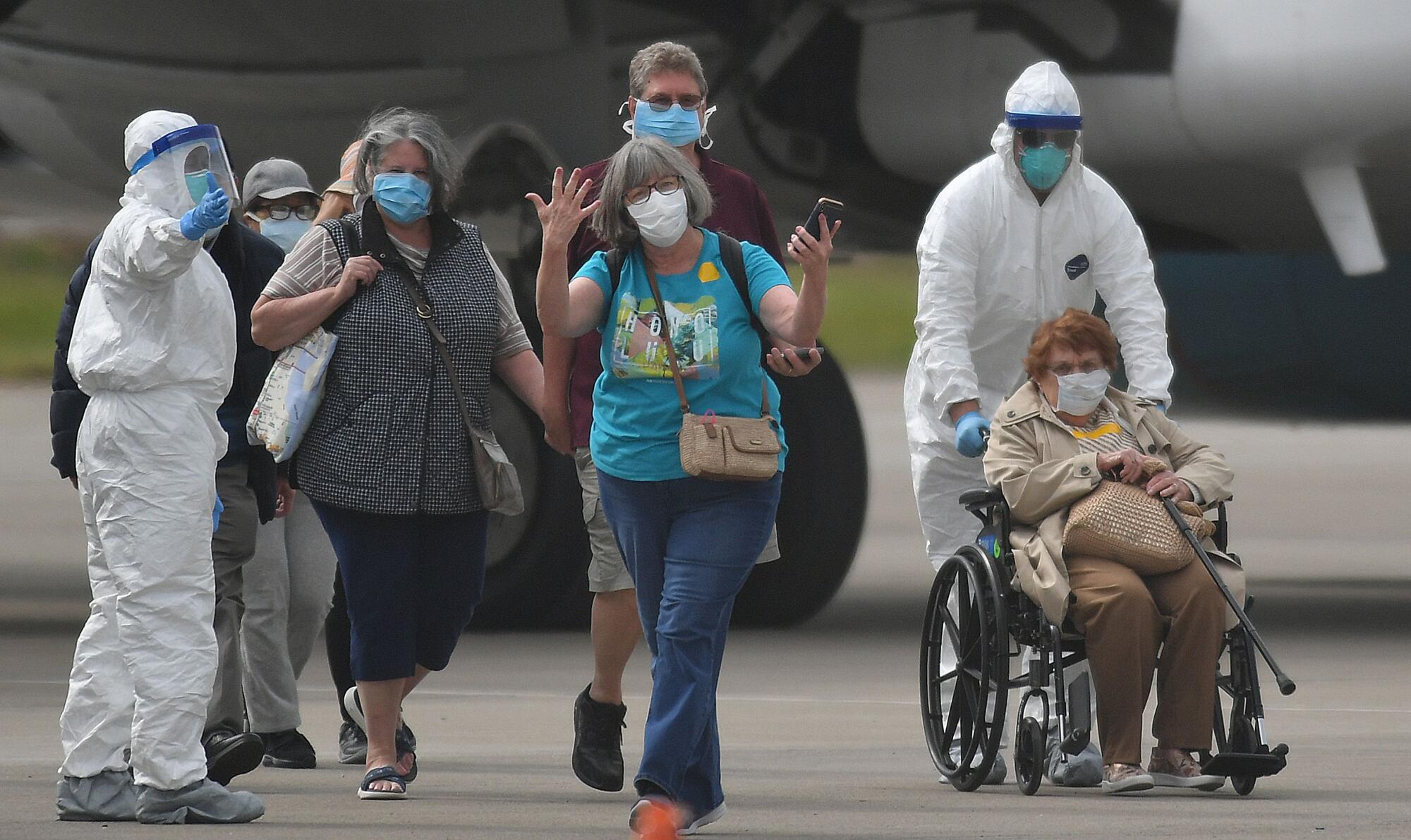
Achter, the memoirist from Utah, recalled sitting on a bus for hours waiting on a tarmac for her flight to the Dobbins Air Reserve Base in Georgia with her parents. After days of isolation in a ship cabin, it was hard to find the logic in it.
“They cram us all together on this bus,” she said. “Then on this charter airplane, we were all sitting by each other there too.”
Racked by stress, she landed at Dobbins with a migraine so vicious she had to be carried off the plane. But her main worry was her 71-year-old mother, who had diabetes and had been rationing her insulin for days. Now her mom lay in bed, too fatigued to move, her blood sugar alarmingly high, her empty insulin pen in her hand.
Achter said she kept pleading with the base pharmacist for help, and the day after their arrival — Saturday night — a nurse arrived with the shot that saved her mother.
At bases across the country, thousands of other dramas, large and small, were playing out in quarantine behind chain-link fences, under floodlights, in the shadow of armed federal guards. At Travis Air Force Base, where the monotony of turkey sandwiches was a frequent complaint, a widower who had been in room B206 on the boat spent $5,800 to have 475 Domino’s cheese pizzas delivered to his companions in quarantine.
Susan Dorety was at Travis too, awaiting news of her husband, who was being treated at the Kaiser hospital in Oakland. She got word that he had the virus, that he was being put into a coma, that his body wasn’t getting oxygen, that his organs were shutting down. “It turned his lungs to rocks,” she said.
He died on March 20, one of six Americans on the Grand Princess killed by complications from the virus, according to HHS. Five were passengers; one was a crew member.
The outbreak on the cruise ship has sparked a flurry of lawsuits, including a wrongful-death claim from the Dorety family.
“Princess Cruises has been sensitive to the difficulties the COVID-19 outbreak has caused to our guests and crew,” the company said in a statement. “Our response throughout this process has focused on the well-being of our guests and crew within the parameters dictated to us by the government agencies involved and the evolving medical understanding of this new illness.”
The cruise line said it will not discuss pending litigation.
“If there were any precautions at the beginning of this, my overcautious husband would have backpedaled so fast,” Susan Dorety said. “He loved hard and he was everybody’s protector. What’s so hard is nobody could take care of him when he needed it. He was all alone.”
More to Read
Sign up for Essential California
The most important California stories and recommendations in your inbox every morning.
You may occasionally receive promotional content from the Los Angeles Times.
